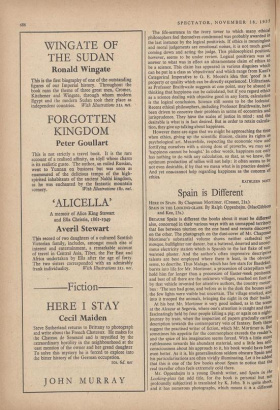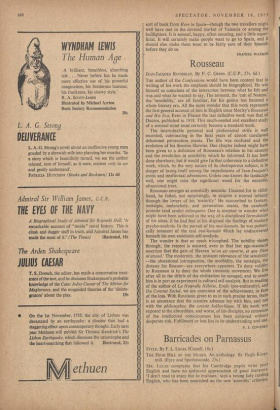Spain is Different
HERE IN SPAIN. By Chapman Mortimer. (Cresset, 21s.) BECAUSE Spain is different the books about it must be different also, concerned in their various ways with an unmapped territory that lies between tourism on the one hand and remote discover), on the other. The photograph on the dust-cover of Mr. Chapman Mortimer's substantial volume shows neither cathedral nor mosque, bullfighter nor dancer, but a battered, deserted and anotlY- mous electricity station which is Spanish to the last flake of sun" warmed plaster. And the author's often impressive descriptive talents are best employed where there is least, in the obvious sense, to describe. Thus Malaga, which has few stars for Baedeker, bursts into life for Mr. Mortimer; a procession of caterpillars Will hold him for longer than a procession of Easter-week penitents; and best of all there are the unknown villages, reached on foot or by that vehicle invented for attentive authors, the country motor- bus : 'The sun had gone, and before us in the dusk the houses and the few lights were visible but uncertain. The village smoked, and into it trooped the animals, bringing the night in on their backs.'
At his best Mr. Mortimer is very good indeed, as in the scene at the Alcazar at Segovia, where one's attention is caught and then fascinatingly held by four people killing a pig; or again on a night journey by train, when the inspection of papers gradually carries description towards the contemporary vein of fantasy. Both these suggest the practised writer of fiction, which Mr. Mortimer is, But sometimes his appetite for the commonplace exceeds the reader's. and the spice of his imagination seems forced. With a little more ruthlessness towards his abundant material, and a little less self- consciousness about his approach to it, his book would have been even better. As it is, his generalisations seldom obscure Spain and his particularisations are often vividly illuminating. Let it be added that this is one of the few books about Spain to notice that the real traveller often feels extremely cold there. Mr. Oppenhejm is a young Danish writer, and Spain in the Looking-glass (an odd title, for the book is personal but not profoundly subjective) is translated by K. John. It is quite short, and it has numerous photographs, which means it is a different
sort of book from Here in Spain—though the two travellers might well have met in the covered market of Valencia or among the bullfighters. It is sensual, happy, often amusing, and a little super- ficial. It will certainly make people want to go to Spain, and it should also make them want to be fairly sure of their Spanish before they do so.
FRANCIS WATSON











































































 Previous page
Previous page